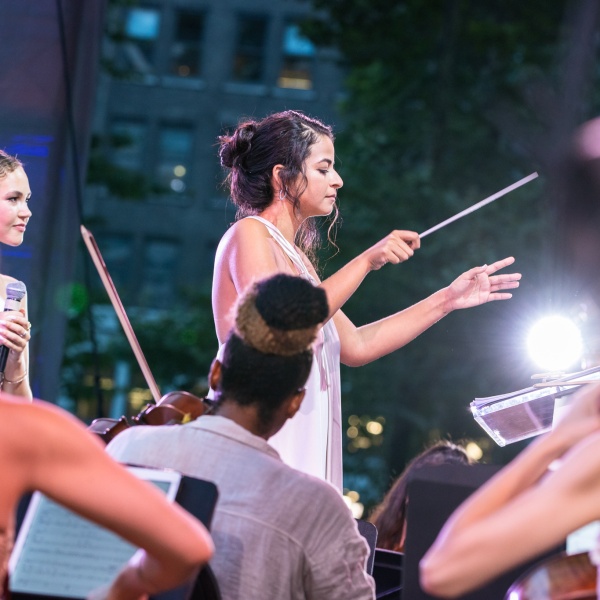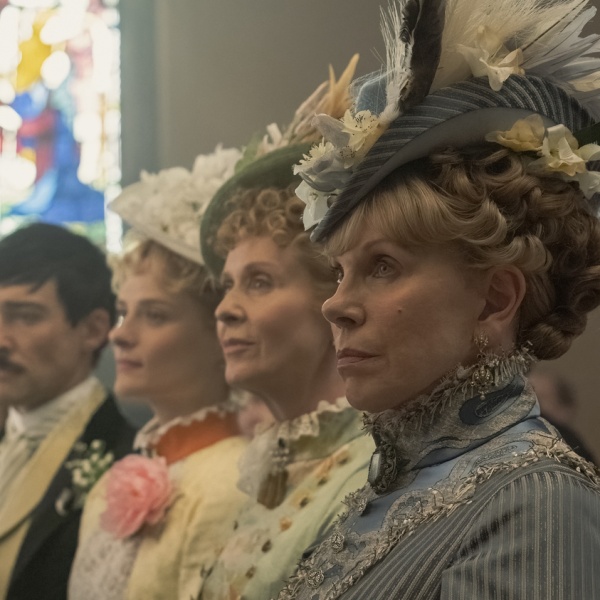Are disaster movies about climate change getting more realistic, or is the real world simply starting to resemble a disaster movie about climate change? To judge by Mahalia Belo’s “The End We Start From,” a despairing and all-too-conceivable thriller in which an unnamed woman (Jodie Comer) struggles to protect her newborn baby after a massive flood makes the whole of England go a little “Children of Men,” the answer to that question is regrettably “both.” Ah, how I long for the days when a Hollywood blockbuster about Jake Gyllenhaal trying to survive a now-routine New York weather system was marketed as a piece of escapism.
There are no giant waves in this small-scale British film about an entire society coming apart at the seams — no shots of the London Eye being knocked into the Thames, nor scenes in which panicked scientists look over data so ominous they can only lift their heads towards the lens and say things like “God help us all.” On the contrary, “The End We Start From” leaves most of its spectacle to the imagination (radio news reports handle the lion’s share of the heavy lifting), freeing Belo to train her camera on the whirlwind of emotions that storm across Comer’s face as her character gradually comes to realize that none of this is just for now.
The rain will stop after a few weeks, and the floods will recede not long thereafter, but the past this woman promised her baby will never resemble the future he’ll grow up to inherit from her. “You won’t remember any of this,” she coos to him at one point. The truth is that he won’t know anything else, and she can’t prepare him to live with that until she’s able to accept it for herself.
Based on the novel of the same name by Megan Hunter, and scripted by Alice Birch with much of the same terse steeliness that she brought to “Lady Macbeth,” Belo’s film is less motivated by sudden doom than by slow-motion entropy. If that proves to be every bit as dreary as it sounds, baby Zeb at least provides a tenuous throughline of hope. It’s thanks to him that “The End We Start From” is at least able to begin on a somewhat positive note, as we first meet Comer’s very pregnant character right as she’s ready to pop.
“Mother,” as she’s referred to in the credits, is alone in her posh-looking townhouse when she goes into labor (her economic status is one of the only things we ever learn about her life before the storm), and the flooding soon grows so intense that her windows shatter after her water breaks, but she’s able to make it to the hospital despite the rain slating down outside. If everyone there seems a bit more harried than usual, Mother is comforted by the sight of her husband “R” at her side (a lovely-seeming chap played by “In the Earth” actor Joel Fry), and the happy family is soon able to return home and focus all their attention on baby Zeb; anyone who had a child during COVID will know what that’s like.
Alas, such privileged myopia can only be sustained for so long when London is sinking into the sea, and Mother, father, and child are soon forced to evacuate north to R’s parents’ house, where they try to create another short-term idyll with grandpa Mark Strong and grandma Nina Sosanya. The illusion begins to crack almost immediately. Neighbors go missing, food is scarce, and R returns from a reconnaissance trip all banged up and bloody.
Mother spends most of her days sitting by the window in desolate long-shots that suggest a post-apocalyptic Sofia Coppola movie, but Anna Meredith’s glassy score — arriving on a breeze of flutes that soon hardens into a percussive fury more intense than anything in “Oppenheimer” or the latest “Mission: Impossible” — denies us any delusion of safety. Needless to say, things go from bad to worse in a hurry, as Mother and Zeb soon find themselves separated from R and stranded in a shelter where the men fight over pillows and the women gossip about offshore communes where everyone tries to ignore what’s happening on the mainland.
That’s more or less all that happens in Belo’s film, which is happy to dither between incidents without ever adopting what you might call a “plot.” That could prove tedious for viewers conditioned to expect Mother to embark on a more clearly defined journey, but “The End We Start From” — as its title suggests — is less interested in reaching a particular destination than it is in guiding its heroine towards a certain state of mind.
Which isn’t to suggest that nothing of note happens to her along the way. For one thing, Mother has a fun habit of crossing paths with some of today’s finest actors; Benedict Cumberbatch shows up as a nice bloke who joins in on a Caribou-soundtracked dance party, while Katherine Waterston aces a larger role as a fellow single mom whose friendship helps keep Mother from drowning (figuratively speaking). Both characters speak to and sharpen the film’s focus on the way that people continue to look after each other in times of crisis, which proves to be a crucial ray of light in a story that’s just as preoccupied with all the ways that they don’t; once Mother is disabused of the idea that strangers will be kind to her because she has a baby, all bets are off.
If these encounters push Mother in a particular direction, it’s towards the understanding that calamity will no longer be a passing blemish on her life, but rather a principle aspect of its condition (the film doesn’t extend much sympathy towards the people in the communes and their practice of willful forgetting). There isn’t much excitement to be found in a movie whose torpor is meant to be a key part of its appeal, but Belo’s steady hand and uncompromising eye finds a slow-burning sense of drama in watching Mother come to the realization that she can’t just wait for this all to blow over.
Comer’s wrenchingly direct performance allows that process to become a movie unto itself, as the war of attrition between her dwindling expectations and ever-increasing anguish unfolds across her eyes with 70mm clarity. “This isn’t how it’s supposed to be,” she tells Zeb. And there’s no arguing with that. But this is awfully close to the way things are, and wishing it away won’t solve anything. The sooner Mother can make peace with that, the sooner she can begin to prepare baby Zeb for the world in which he’ll be living. That’s not the happiest thought in the world, but as “The End We Start From” suggests in its stirring final moments, we can still take some solace from the fact that he won’t be living in it alone.
Grade: B-
Republic Pictures for distribution by Paramount Global Content Distribution will release “The End We Start From” in New York and Los Angeles on Friday, December 8 with expansion to follow.






